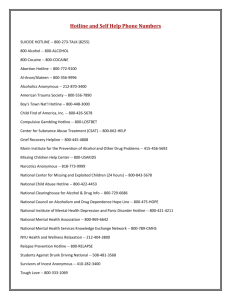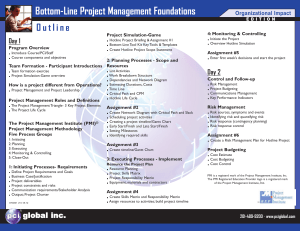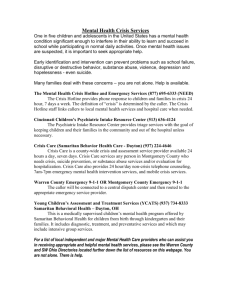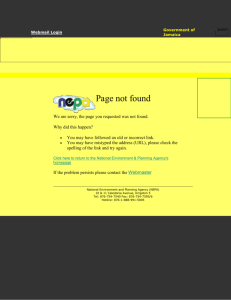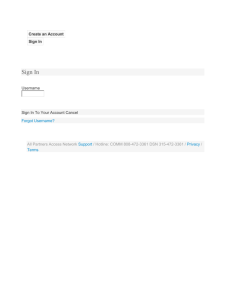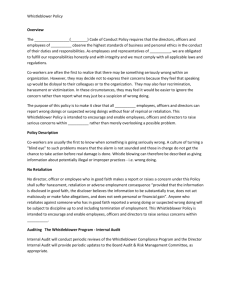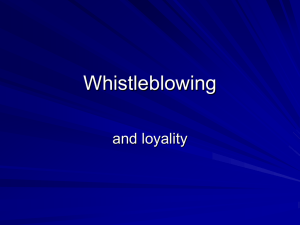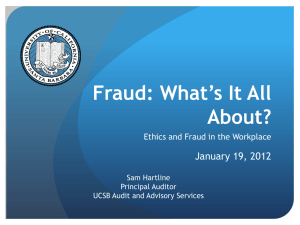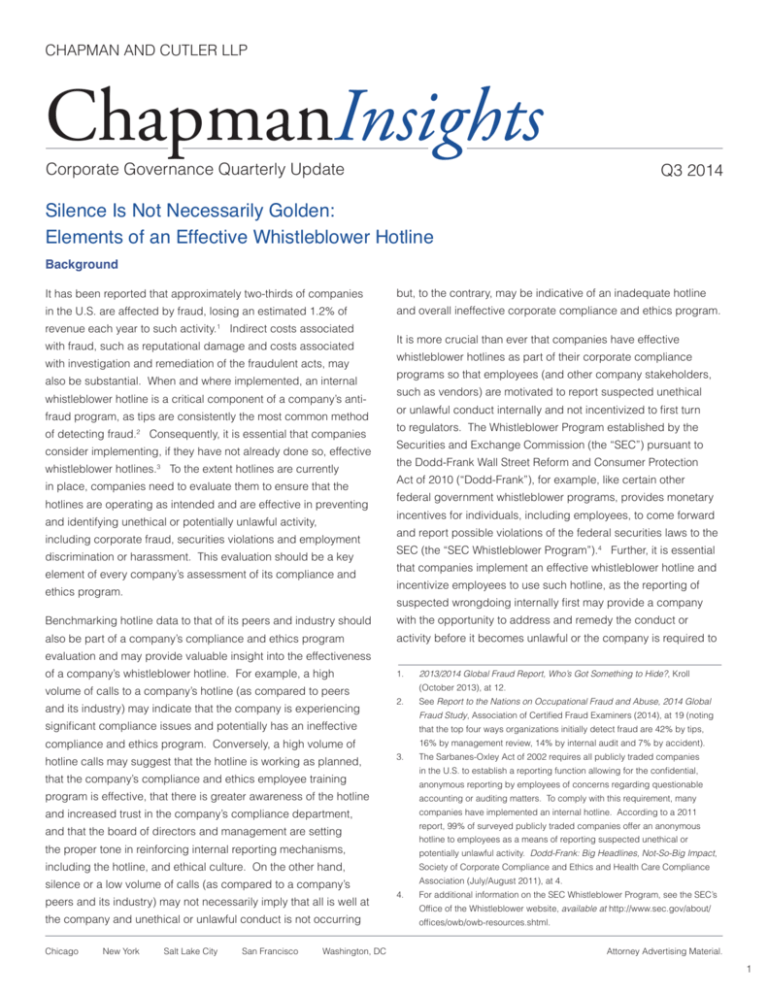
CHAPMAN AND CUTLER LLP
ChapmanInsights
Corporate Governance Quarterly Update
Q3 2014
Silence Is Not Necessarily Golden:
Elements of an Effective Whistleblower Hotline
Background
It has been reported that approximately two-thirds of companies
but, to the contrary, may be indicative of an inadequate hotline
in the U.S. are affected by fraud, losing an estimated 1.2% of
and overall ineffective corporate compliance and ethics program.
revenue each year to such activity.
1
Indirect costs associated
with fraud, such as reputational damage and costs associated
with investigation and remediation of the fraudulent acts, may
also be substantial. When and where implemented, an internal
whistleblower hotline is a critical component of a company’s antifraud program, as tips are consistently the most common method
of detecting fraud.2 Consequently, it is essential that companies
consider implementing, if they have not already done so, effective
whistleblower hotlines.3 To the extent hotlines are currently
in place, companies need to evaluate them to ensure that the
hotlines are operating as intended and are effective in preventing
and identifying unethical or potentially unlawful activity,
including corporate fraud, securities violations and employment
discrimination or harassment. This evaluation should be a key
element of every company’s assessment of its compliance and
ethics program.
It is more crucial than ever that companies have effective
whistleblower hotlines as part of their corporate compliance
programs so that employees (and other company stakeholders,
such as vendors) are motivated to report suspected unethical
or unlawful conduct internally and not incentivized to first turn
to regulators. The Whistleblower Program established by the
Securities and Exchange Commission (the “SEC”) pursuant to
the Dodd-Frank Wall Street Reform and Consumer Protection
Act of 2010 (“Dodd-Frank”), for example, like certain other
federal government whistleblower programs, provides monetary
incentives for individuals, including employees, to come forward
and report possible violations of the federal securities laws to the
SEC (the “SEC Whistleblower Program”).4 Further, it is essential
that companies implement an effective whistleblower hotline and
incentivize employees to use such hotline, as the reporting of
suspected wrongdoing internally first may provide a company
Benchmarking hotline data to that of its peers and industry should
with the opportunity to address and remedy the conduct or
also be part of a company’s compliance and ethics program
activity before it becomes unlawful or the company is required to
evaluation and may provide valuable insight into the effectiveness
of a company’s whistleblower hotline. For example, a high
volume of calls to a company’s hotline (as compared to peers
and its industry) may indicate that the company is experiencing
1.
(October 2013), at 12.
2.
hotline calls may suggest that the hotline is working as planned,
that the top four ways organizations initially detect fraud are 42% by tips,
16% by management review, 14% by internal audit and 7% by accident).
3.
anonymous reporting by employees of concerns regarding questionable
program is effective, that there is greater awareness of the hotline
accounting or auditing matters. To comply with this requirement, many
companies have implemented an internal hotline. According to a 2011
and increased trust in the company’s compliance department,
report, 99% of surveyed publicly traded companies offer an anonymous
and that the board of directors and management are setting
hotline to employees as a means of reporting suspected unethical or
the proper tone in reinforcing internal reporting mechanisms,
potentially unlawful activity. Dodd-Frank: Big Headlines, Not-So-Big Impact,
including the hotline, and ethical culture. On the other hand,
peers and its industry) may not necessarily imply that all is well at
the company and unethical or unlawful conduct is not occurring
Chicago
New York
Salt Lake City
San Francisco
Washington, DC
The Sarbanes-Oxley Act of 2002 requires all publicly traded companies
in the U.S. to establish a reporting function allowing for the confidential,
that the company’s compliance and ethics employee training
silence or a low volume of calls (as compared to a company’s
See Report to the Nations on Occupational Fraud and Abuse, 2014 Global
Fraud Study, Association of Certified Fraud Examiners (2014), at 19 (noting
significant compliance issues and potentially has an ineffective
compliance and ethics program. Conversely, a high volume of
2013/2014 Global Fraud Report, Who’s Got Something to Hide?, Kroll
Society of Corporate Compliance and Ethics and Health Care Compliance
Association (July/August 2011), at 4.
4.
For additional information on the SEC Whistleblower Program, see the SEC’s
Office of the Whistleblower website, available at http://www.sec.gov/about/
offices/owb/owb-resources.shtml.
Attorney Advertising Material.
1
Corporate Governance Quarterly Update
report it to regulators. There is often a fine line between unethical
assistance” relating to fraud in the securities market
and unlawful conduct in the current regulatory environment and
(which represented 30% of the nearly $3 million in
the reporting of suspected wrongdoing by an employee (or the
sanctions the SEC collected in the enforcement action);
company) to regulators may trigger a government investigation or
••
shareholder suit (either of which may require lengthy, costly and
resource-intensive actions by the company to defend).
internally certain securities law violations;
To provide context as to the successes and potential monetary
••
incentives of certain government whistleblower programs, this
wrongdoing to the SEC after the company failed to take
the SEC Whistleblower Program. This update then (1) examines
action when the employee reported it internally first; and
why employees may choose to avoid internal whistleblower
hotlines in favor of reporting to regulators, such as the SEC,
••
and (2) identifies certain practices that boards of directors
a foreign country who provided information about “an
whistleblower reporting internally and help implement an effective
ongoing fraud that would have been very difficult to
whistleblower hotline and reporting program.
detect” and which led to a successful SEC enforcement
action.8
Current State of the SEC Whistleblower Program
Under the SEC Whistleblower Program, eligible whistleblowers
can potentially recover a reward equal to 10%–30% of the
amount of any monetary sanctions collected that exceed
$1 million in actions brought by the SEC and related actions
brought by other regulatory and law enforcement authorities.
The SEC Whistleblower Program also prohibits retaliation
by employers against employees who provide the SEC with
information about possible securities violations, including
accounting fraud, market manipulation, insider trading,
misleading statements in public filings and misrepresentations in
the sale of securities. Notably, the SEC Whistleblower Program
does not require that employee whistleblowers report violations
internally in order to qualify for an award. SEC rules do, however,
add certain incentives intended to encourage employees
to utilize their company’s internal compliance and reporting
Based upon the volume and increasing number of whistleblower
tips to the SEC and the sizeable awards granted under the SEC
Whistleblower Program to certain of the individuals providing
those tips, companies should evaluate and determine the
effectiveness of their internal compliance program, with a
particular focus on their whistleblower hotline, to ensure that
employees are encouraged and motivated to report suspected
unethical or unlawful conduct by way of the company’s hotline.
Reasons Why Employees May Choose to Avoid
Internal Whistleblower Hotlines
Assessing the effectiveness of an internal whistleblower hotline
(should such hotline exist) and addressing reasons why
5.
Such incentives, for example, include (1) making a whistleblower
eligible for an award if the whistleblower reports internally, the company
programs when appropriate to do so.5
informs the SEC about the violation and a successful SEC action ensues,
(2) treating an employee as a whistleblower, under the SEC program, as
The SEC has received a high volume of hotline calls since the
of the date that employee reports the information internally, as long as the
SEC Whistleblower Program became effective in 2011, with 3,238
employee provides the same information to the SEC within 120 days and
(3) providing that a whistleblower’s voluntary participation in the company’s
calls received in fiscal 2013 (up from 3,001 in fiscal 2012). The
internal compliance and reporting programs is a factor that can increase the
most common complaint categories reported by whistleblowers
in those calls involved fraud in corporate disclosures and
financials, offering fraud and stock price manipulation.6 The SEC
has also exercised its authority under Dodd-Frank and brought
a number of actions based upon those whistleblower tips. In
fiscal 2013, the SEC issued 118 enforcement judgments and
orders, which generated award payments of nearly $15 million to
whistleblowers.7 More recently, in 2014, the SEC has awarded
the following:
amount of an award.
6.
U.S. Securities and Exchange Commission: 2013 Annual Report to Congress
on the Dodd-Frank Whistleblower Program, at 8.
7.
Id. at 13 and 15.
8.
SEC Press Release 2014-113 (June 3, 2014) and Order Determining
Whistleblower Award Claim, SEC Release No. 72301, File No. 2014-5
(June 3, 2014); SEC Press Release 2014-154 (July 31, 2014) and Order
Determining Whistleblower Award Claim, SEC Release No. 72727,
File No. 2014-8 (July 31, 2014); SEC Press Release 2014-180 (August 29,
2014) and Order Determining Whistleblower Award Claim, SEC Release
No. 72947, File No. 2014-9 (August 29, 2014); SEC Press Release 2014-206
in June, $875,000 to two individuals for “tips and
New York
in September, more than $30 million (the SEC’s largest
whistleblower award to date) to an employee living in
and company management may consider to help facilitate
Chicago
in August, $300,000 to a company employee who
performed audit and compliance functions and reported
corporate governance update first discusses the current state of
••
in July, $400,000 to a whistleblower who reported fraud to
the SEC after the employee’s company failed to address
Salt Lake City
San Francisco
Washington, DC
(September 22, 2014) and Order Determining Whistleblower Award Claim,
SEC Release No. 73174, File No. 2014-10 (September 22, 2014).
Attorney Advertising Material.
2
Corporate Governance Quarterly Update
employees choose to avoid reporting tips by way of that hotline in
for prompt identification and redress of suspected
favor of reporting to regulators should be an integral component
unethical or unlawful acts and provides management with
of evaluating a company’s compliance and ethics program.
the necessary tools to resolve such acts internally.
There are a number of reasons employees may avoid hotlines,
••
such as the fear of retaliation (including dismissal, constructive
discharge and loss of career advancement opportunities) or
Anonymity and confidentiality. Employees should
be able to make whistleblower tips anonymously or, at
the very least, confidentially, as research indicates that
being labeled a “snitch” or “rat” and the fact that some company
employees are more comfortable reporting suspected
hotlines may only provide for the ability to actually blow the
wrongdoing when such options are available. In 2013,
whistle and do not serve any additional function.9 Further,
60% of internal fraud tips were reported anonymously.11
employees may perceive that they do not have shared values
Anonymous and confidential reporting mechanisms help
with the company or that the “tone at the top” among the board
foster a climate whereby company employees are more
of directors and management is not one that promotes or
likely to report or seek guidance regarding potential or
rewards ethical behavior. Moreover, employees simply may not
actual wrongdoing without fear of retaliation.
be aware of the hotline, how it works, the procedures involved,
the ramifications of calling and making a report, or the various
••
hotline-related protections provided to them, including the
confidentiality of calls.
No retaliation. Companies must emphasize when
publicizing hotline reporting procedures that they will
not and are prohibited by law from retaliating against
Considerations to Help Facilitate Whistleblower
Reporting Internally and Implement an Effective
Whistleblower Hotline and Reporting Program
employees who make whistleblower reports. The
To address reasons employees may be reluctant to use an
a company’s whistleblower processes, including making
internal whistleblower hotline and to help facilitate an effective
hotline reports without fear of retaliation, is essential
whistleblower hotline and reporting program, boards of directors
to motivate employees to report suspected unethical
and management should consider the following:
or unlawful conduct internally. Further, in addition to
••
fear of retribution is generally strong among potential
whistleblowers and such fear may adversely affect the
effectiveness of the internal reporting process. Trust in
the whistleblower anti-retaliation protections found in
Hotline as an integral part of company’s corporate
a number of federal statutes, most states also provide
compliance and ethics program. A whistleblower
related protections that may apply.
hotline is often a key component of an effective corporate
••
compliance and ethics program. Research reveals
that internal employee hotlines facilitate the detection
financial as well as non-financial reporting incentives,
of unethical or unlawful conduct, as tips are the most
such as cash rewards or extra vacation days, for
common detection method for suspected wrongdoing
whistleblower reports that lead the company to identify
in companies with or without hotlines. In companies
suspected unethical or unlawful activity. Although the
with an internal hotline, tips account for over half of all
percentage of companies offering rewards for internal
fraud detection versus only one-third of detections in
whistleblowers is estimated to be approximately 10%,
companies with no internal hotline. Notably, the rate
external incentives (such as the SEC Whistleblower
of discovering fraud “by accident” more than doubles
Program’s financial rewards) may motivate employees
when a company fails to offer a hotline.
to first report outside the organization.12 A company
10
Therefore,
companies should review their internal compliance and
reporting programs, including hotlines, as well as their
internal investigation procedures, and consider initiatives
may minimize external incentives by offering its own
9.
“Considerations to Help Facilitate Whistleblower Reporting Internally and
pose the most risks to the company) that actively
promote those programs (emphasizing confidentiality and
non-retaliation), simplify reporting procedures and
attempt to make related policies more accessible and
easy to understand. A company’s hotline policy should
be a clear, well-communicated written policy that allows
New York
Salt Lake City
San Francisco
Washington, DC
Some whistleblower hotlines are established for the sole purpose of
reporting suspected unlawful activity. As discussed further below under
(e.g., a training program that identifies the areas that
Chicago
Whistleblower incentives. Companies should offer
Implement an Effective Whistleblower Hotline and Reporting Program,” other
hotlines also serve additional purposes, such as “helplines.”
10.
Report to the Nations on Occupational Fraud and Abuse, 2014 Global Fraud
Study, supra note 2, at 22.
11.
The 2014 Ethics and Compliance Hotline Benchmark Report, NAVEX Global
(March 2014), at 12.
12.
Report to the Nations on Occupational Fraud and Abuse, 2014 Global Fraud
Study, supra note 2, at 31.
Attorney Advertising Material.
3
Corporate Governance Quarterly Update
reward/compensation system to internal whistleblowers
reporting suspected wrongdoing outside of normal work
for tips that identify unethical conduct, fraud and
hours to preserve anonymity.
waste and those that save the company resources,
••
for example, through workplace safety and process
improvements.
••
contemplate calling the hotline, such as having the hotline
Positive “tone at the top.” SEC Chair Mary Jo White
also serve as a helpline, as this may alter the perception
recently commented that it is up to company directors,
or negativity associated with hotlines and facilitate
along with senior management under the purview of the
reducing the fear of calling and the associated stigma.
board, to set the “all-important ‘tone at the top’ for the
For example, a company can encourage employees to
entire company.” Setting the standard in the boardroom
use the hotline/helpline to receive interpretative guidance
that good corporate governance and rigorous
on provisions of the company’s code of ethics, make
compliance are essential helps establish a strong
efficiency and process improvement suggestions (which
corporate culture throughout a company.
could potentially save the company resources through
13
Creating a
culture in which internal reporting is valued and where
innovative employee ideas) or report quality control
tipsters are protected is essential to preventing and
or workplace safety concerns. Further, board and
detecting suspected unethical or unlawful conduct. A
management actions that help change the perception of
positive tone from the top of a company may ease the
using the company hotline may reduce the barriers an
stigma of utilizing a company hotline, making employees
employee feels before reporting his or her first tip and,
feel less intimidated when they decide whether to report
after such tip, the employee may be more readily inclined
to the internal hotline in the future. Also, a board’s or
to report future suspected wrongdoing. Research reveals
management’s effective and expeditious response
that employees who are repeat tipsters to the company’s
to hotline calls will help facilitate communicating a
internal hotline have a higher rate of legitimate claims than
proper message to employees so they do not lose
first-time reporters.15
faith in the board or management and feel as though
••
their only option is to report suspected wrongdoing to
regulators. Further, senior management should praise
Record and analyze statistics. Companies should
use their hotlines as a tool for collecting and analyzing
information on the company’s overall internal compliance,
whistleblowers who first report suspected unethical
reporting and ethics program. Data a company receives
or unlawful conduct internally (versus to regulators) to
in connection with its whistleblower hotline should be
reinforce that such action is encouraged and supported.
••
Multiple uses for hotline, including a helpline.
Companies should expand the reasons an employee may
reviewed by management with board oversight to monitor,
Educate, publicize and make hotline available.
among other metrics, the rate of employee hotline use, the
Companies should ensure that their compliance and
company’s record of following up on tips, whether claims
ethics program includes regularly educating employees
are substantiated and the departments that are most
on and publicizing the who-what-when-where-why-
frequently implicated in the reports.
how of reporting suspected unethical or unlawful
••
activity via the company’s whistleblower hotline. A
portion of the compliance department’s budget should
Benchmark. Companies should benchmark their
compliance programs to internal (e.g., location, business
units and departments) and external (e.g., peers and
be dedicated to educating (e.g., on what types of
industry) data sources. Company data is often available
activities or observations are appropriate for reporting
by way of its internal or third-party hotline database,
and those that are not) and promoting the company’s
while peer and industry hotline data may be purchased
hotline. Certain compliance experts note that keeping
a positive hotline message (for example, using words
such as accountability, transparency, responsibility
13.
embezzlement, bribery and crime) may help alleviate
psychological barriers that prevent or discourage
tipsters from using the hotline.14 Further, companies
should make hotlines available 24 hours a day and 365
days a year. Employees may feel more comfortable
Chicago
New York
Salt Lake City
San Francisco
Washington, DC
SEC Chair Mary Jo White (Speech), Stanford University Rock Center for
Corporate Governance, Twentieth Annual Stanford Directors’ College (June
and citizenship as opposed to fraud, corruption,
23, 2014).
14.
See Hotlines for Heroes: Making a Fraud Hotline Accessible and Successful,
Fraud Magazine, Janet M. McHard and Beth A. Mohr (July/August 2011), at 32.
15.
See The 2014 Ethics and Compliance Hotline Benchmark Report, supra note
11, at 10 (reporting that first-time tipsters have a 35% substantiation rate
versus 40% for repeat tipsters).
Attorney Advertising Material.
4
Corporate Governance Quarterly Update
••
from third-party providers. Hotline data benchmarking
The quality of a company’s internal compliance and reporting
provides companies with comparative information
programs and how effectively they are communicated to
to determine reporting patterns that are higher than,
employees may significantly impact whether a whistleblower
lower than or in line with peers and their industry, which
first reports internally or approaches a regulator, such as the
information may suggest mistrust or misuse of the
SEC. An effective whistleblower hotline is a good corporate
whistleblower hotline or be indicative of more serious
governance practice, is essential to a company’s successful
company-wide compliance and ethics issues.
corporate compliance program and in turn, the company’s longterm success, and helps ensure that a silent hotline reflects the
Hotline managed by third-party provider.
effectiveness of a company’s compliance and ethics efforts and is
Whistleblower hotlines should be managed by
independent third-party providers which, if so used by
a company, should be well publicized to its employees.
Employees tend to trust independently managed more
than internally maintained hotlines. Further, third-party
providers generally have more experience in managing
whistleblower calls and may provide company boards
and management with insightful hotline data, reports and
analyses of the effectiveness of the hotline.
••
••
How Chapman Can Help
Chapman and Cutler attorneys provide corporate and business
counseling to a wide range of clients, both publicly and privately
held entities, with a focus on financial services institutions, utilities,
investment advisors, insurance companies, manufacturers,
distributors, wholesalers, retailers, contractors, transportation
companies, professional service providers, pension funds and
Allow multiple methods for submitting tips.
not-for-profit entities. Chapman and Cutler maintains a dedicated
Employees should be allowed to submit whistleblower
Corporate Counseling Practice Group with the necessary skills
tips in multiple forms such as via U.S. mail, a designated
and experience to counsel on the issues presented in this
website and a dedicated phone line. Depending
corporate governance update. If you would like to discuss any
on a number of factors (e.g., location, educational
of the issues contained in this update or other legal, regulatory,
background, age and level of employment), employees
compliance or corporate governance-related issues facing your
may differ on their preferred method of reporting
institution, please contact an attorney in our Corporate Counseling
compliance concerns.
Practice Group.
Evaluate, test and audit. Hotlines, whether managed
internally or outsourced to a third party, should be
evaluated, tested and audited to ensure that the manner
in which hotline calls are received, recorded and
managed is consistent, confidential, accurate and timely,
and that the hotline is operating as intended by the
board and management.
••
not an indication of something more ominous.
Educate other stakeholders and grant access to
hotline. Companies should expand trainings and
dissemination of educational materials relating to their
compliance and ethics program to include not only
This document has been prepared by Chapman and Cutler LLP attorneys for
informational purposes only. It is general in nature and based on authorities
that are subject to change. It is not intended as legal advice. Accordingly,
readers should consult with, and seek the advice of, their own counsel with
respect to any individual situation that involves the material contained in this
document, the application of such material to their specific circumstances, or
any questions relating to their own affairs that may be raised by such material.
To the extent that any part of this summary is interpreted to provide tax advice,
(i) no taxpayer may rely upon this summary for the purposes of avoiding
penalties, (ii) this summary may be interpreted for tax purposes as being
prepared in connection with the promotion of the transactions described, and
(iii) taxpayers should consult independent tax advisors.
© Chapman and Cutler LLP, 2014. All Rights Reserved.
employees, but also other company stakeholders (such
as vendors) and agents. Regularly educating other
stakeholders and agents on the who-what-when-wherewhy-how of reporting suspected wrongdoing by way
of the company’s hotline may prove beneficial to the
company through an increased number of substantiated
hotline reports.
Chicago
New York
Salt Lake City
San Francisco
Washington, DC
Attorney Advertising Material.
5
About the Authors
Bill Libit
Chief Operating Partner
Chicago Office
T: 312.845.2981
F: 312.516.3981
libit@chapman.com
Bill Libit is the Chief Operating Partner of Chapman and Cutler and has concentrated his practice in the
corporate and securities area since 1985, when he began the practice of law at the firm. Bill’s corporate and
securities practice includes representation of issuers in connection with private and public offerings of debt and
equity securities. He also represents issuers in other aspects of their business involving compliance with federal
securities regulation, including preparation and review of required periodic fillings including 10-Ks, 10- Qs and
proxy statements and press releases and communications with institutional investors and other shareholders
as well as corporate governance matters. In addition, he advises corporate clients on matters relating to
compliance with NYSE and NASDAQ listing requirements.
Walt Draney
Partner
Chicago Office
T: 312.845.3273
F: 312.516.3273
walter_draney@chapman.com
Walt Draney is a Partner in the firm’s Corporate and Securities Group and has been practicing law since 1999
when he joined Chapman and Cutler. He works in the corporate securities area, with an emphasis on traditional
securities transactions. Walt represents a wide range of clients in the structuring and negotiation of public and
private securities transactions, including underwriting arrangements, mergers and acquisitions agreements,
disclosure documents, registration with the SEC and listing on NASDAQ and the NYSE. He also advises publicly
held companies, including investment companies, bank holding companies, public utilities and traditional
manufacturers in corporate governance matters, including proxy materials, periodic reports required to be filed
with the SEC and ongoing disclosure and securities law matters. In addition, Walt has extensive experience
representing registered investment advisers and funds registered under the Investment Company Act of 1940
and has worked with attorneys throughout the firm in structuring transactions to fall within exemptions from the
Investment Company Act and Investment Advisers Acts.
Todd Freier
Senior Counsel
Chicago Office
T: 312.845.3810
F: 312.516.1810
freier@chapman.com
Todd Freier is Senior Counsel at Chapman and Cutler. He concentrates in the area of corporate and securities.
Todd’s corporate and securities practice includes providing counsel to corporate clients involving compliance
with federal securities regulation and exchange listing requirements, including preparation and review of
required filings under Sections 13 (periodic reports), 14 (proxy statements) and 16(a) (directors, officers and
principal stockholders reports) of the Exchange Act, communications with institutional investors and other
shareholders, as well as providing counsel on general corporate governance matters, including drafting
committee charters and corporate policies.
Chicago
New York
Salt Lake City
San Francisco
Washington, DC
Attorney Advertising Material.
6

